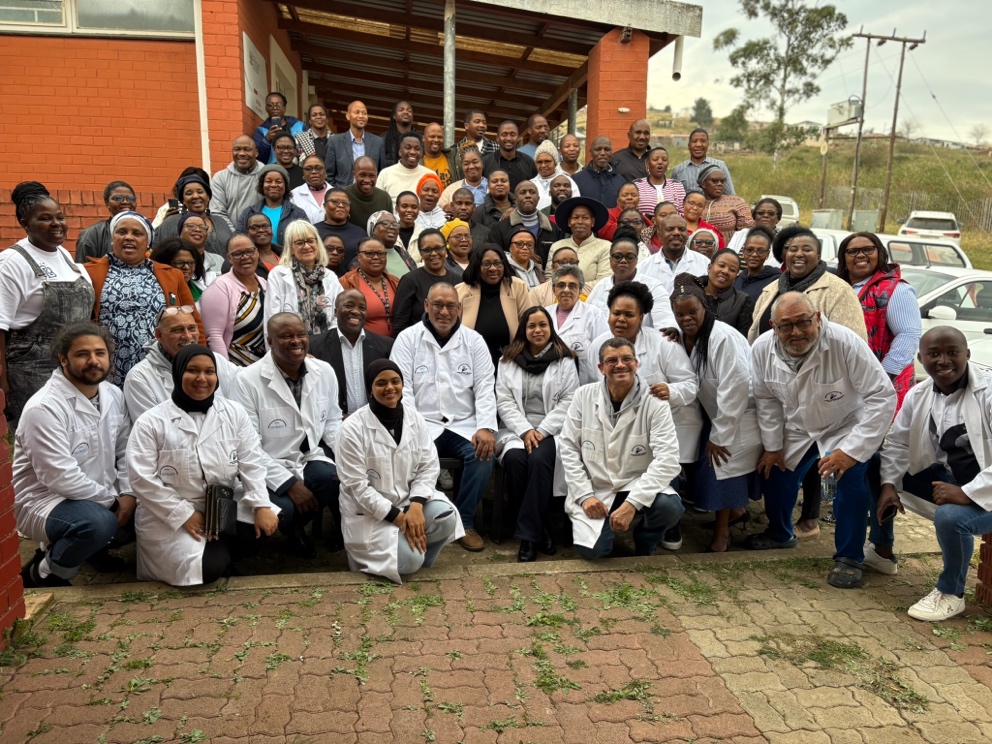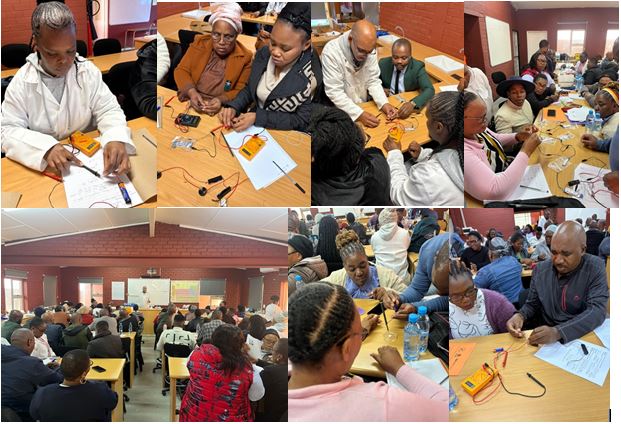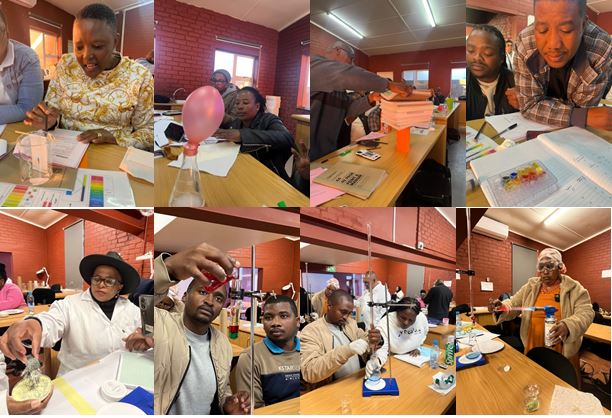
In the first week of July 2025 Advancing Knowledge NPC (AK NPC) continued its inquiry-based science training for natural science teachers with two programmes running parallel, one for intermediate-senior (intersen) phase covering grades 4 to7, and a second for senior phase (grades 8 & 9). The training took place at the modern science laboratories constructed by Prof Shaheed Hartley, Director of AK NPC, at Butterworth district offices of Amathole East Education District. A total of 84 teachers registered for the training that was scheduled for the first week of the mid-year vacation period (1-4 July 2025) meaning attending teachers willingly offered a week of their vacation period to participate in the programme. The training took place in the form of a SACE endorsed short course called Inquiry-Based Science Education (IBSE01) which allowed participating teachers professional development points that would add value when applying for new or promotion posts. According to the GET Head of Amathole East, Mr Sibo Hlalukana, “we value our training partnership with Prof Hartley and his AK NPC team and the practical and experimental nature of the inquiry-based course is of utmost importance to improve the teaching and learning of natural science at GET (grades 9 and below), but also provides the foundation for STEM subjects at the FET (grades 10-12) level”.
ENERGY & CHANGE (PHYSICS) AS A KNOWLEDGE AREA OF NATURAL SCIENCE
The experienced Mr Robert Solomon facilitated both intersen (grades 4-7) and senior phase (grades 8 and 9) energy & change sessions for natural science teachers – senior phase took place on Tuesday 1 July and intersen on Thursday 3 July 2025. Both sessions started with simple activities that teachers could use as introduction or ice breakers in their science lessons. Teachers were guided to develop the curriculum content from simple to complex through investigations that used simple devices to illustrate physics concepts, making cells with salt water, using foil as electrodes in simple electric circuits, using pencils to conduct electricity, to using magnetic backing strips to adhere an elementary electric circuit teaching resource on the black board and changing the voltage, resistance and current in the circuit. Senior phase teachers were provided with more complex challenges including the conduction of heat by different colour sheets, simple everyday experiments to demonstrate energy transfer through, conduction, convection and radiation, using multimeters to measure voltage, resistance and current strength and the measuring the strength of forces and application of forces. The inquiry-based approach to elicit critical inquiry skills were incorporated in the presentation as well as the complexity of the questions and the nature of the scientific activities. Teachers were clearly enjoying their participation and were involved in all the activities as could be witnessed by constructive loud interactions between themselves as well as with the facilitators and interns. One of the teachers exclaimed to the facilitator at the end of the session that “we need more of these kind of practical sessions where can use what we have experienced here today directly into our science lessons”.

LIFE & LIVING (LIFE SCIENCES) AS A KNOWLEDGE AREA OF NATURAL SCIENCE
The intersen life & living session was conducted by Dawn Faroe on Wednesday 2 July and the senior phase by Fadli Wagiet on Thursday 3 July – both are experienced facilitators of life sciences. The key part of the presentations was to demonstrate to teachers how inquiry-based approach in science lessons could be applied to the curriculum content. The presentations made use everyday products and resources to highlight the practical and experimental aspects of the curriculum and to illustrate science concepts, processes and critical skills through an inquiry lens. Teachers were guided in a hands-on format to allow them the experience of conducting the practical work themselves – and to be able to translate this to their own natural science lessons. The varied activities that intersen teachers interacted with included illustrations of habitats, human skeletons, food tests, starch testing in leaves, microscopy, chromatography on leaves, etc. The senior phase teachers were guided from taking leaves from trees outside the lab to extracting chlorophyll and testing for carbohydrates like starch in the leaves. The tests were then extended to various fruit and food products. The biggest interest were drawn by actual sheep lungs, trachea and heart and participants were asked to blow through the trachea to witness the expansion of the lungs. The explanation of the workings of internal organs were made real in this way. They were also provided an opportunity to develop models of the organs to explain the functioning of these organs. One intersen teacher said: “I enjoyed working with the microscope and how to prepare slides using plant tissue. I will now be able to use the microscope at school”. A group of senior phase teachers agreed that the workshop certainly added value to their everyday teaching since they can use the hands-on examples in their life sciences lessons. “Practical work has just been given a new meaning” said one teacher in the group.
MATTER & MATERIALS (CHEMISTRY) AS A KNOWLEDGE AREA OF NATURAL SCIENCE
The matter & materials (chemistry) sessions were facilitated Ms Zaiboen Ahmed (intersen group) on Tuesday 2 July 2025 and Prof Shaheed Hartley (senior phase group) on Wednesday 3 July 2025. The large group of intersen teachers were very loud and excited as they participated in the science activities that highlighted important practical aspects of the matter and materials knowledge area of natural science. The science inquiry activities in which intersen teachers participated included simulated science experiments to explain issues around dependent, independent and constant variables. Teachers delved into inquiry-based hands-on activities in chromatography, compressibility of matter, acid-base reactions and testing the strength of materials. One teacher remarked “The use of everyday substances to illustrate the practical part of the chemistry was important for me and will definitely help me in my lesson preparation for chemistry in natural science. Once our learners get involved in the lessons by doing these activities themselves, it would make them feel part of the class. It would improve learning and interest in natural science”.
In the senior phase session, Prof Hartley explained the importance of evidence in a scientific process of data collection by giving teachers a problem to analyse and challenging them to use the steps of the scientific method to evaluate and challenge their original hypothesis. Teachers were quite excited by the hands-on activities conducted during the course and actively participated in all the investigations and experiments. The course took teachers through and understanding of matter, elements, the periodic table, molecules, compounds, mixtures, chemical reactions and equations, and the inquiry-based presentation of the chemistry content. Teachers were actively involved in identifying, differentiating and distinguishing various chemistry concepts and debating issues such as the scientific method, the importance of context and content, molecules and compounds, density and buoyancy, etc. He demonstrated the practical skills in the preparation of gases, like oxygen, hydrogen and carbon dioxide which are important for learners to understand when moving to physical science in the FET phase. Teachers were literally taken by hand in the preparation of these gases. Teachers were very excited and appreciative of the practical chemistry session and expressed their appreciation for this process with comments like “this is a workshop that literally assist us at every point of the experimental and practical activities, and guides our hands on how to do the practical demonstrations as well as those activities with which learners could actively get involved.”

PLANET EARTH & BEYOND (ASTRONOMY) AS A KNOWLEDGE AREA OF NATURAL SCIENCE
Doctoral student in astronomy Mr Andrew Firth, facilitated the senior phase and Mark Ogilvie worked with the intersen group in parallel, on Wednesday 2 July 2025. Advancing Knowledge NPC staff loaded the latest software for astronomy on teachers’ laptop computers and memory cards. The intersen group were given practical explanations of the position of the Earth in the solar system, galaxy, and universe, the phases of the moon, the exploration of Mars and the construction of Mars rovers, the process of the formation of sedimentary rocks and fossils, creating a plaster of paris trace fossil and the fossilization process, balloon rockets and other homemade rockets, exploring the basics of rocket propulsion. One group of teachers expressed that “we appreciate the activities that we can take back to our classes so that our learners participate in the lessons and not be bored by theoretical lessons”.
Andrew took the senior phase teachers on a journey from earth to the other planets in our solar system, from our milky way to other galaxies. Teachers were challenged on their basic understanding of astronomy, the changes from day to night, how the moon influences tides, and what happens during eclipses. NASA programmes and software packages like Stellarium (program for viewing stars, constellations and folklore) and Celestria (viewing planets, comparing planets and individual planets, moons, etc.) were loaded on teachers’ lap top computers and guided how to use these programs as part of their teaching resources to make lessons more interesting for their learners. Teachers in one group indicated that “we never attended courses in astronomy as part of our education studies and we were basically left on our own devices to set up lessons with our limited knowledge and resources available. It was good to have someone with an understanding of astronomy to direct questions at and be given answers.”
EVALUATION OF THE COURSE
The following are excerpts from teachers’ responses in their evaluation of the course:
InterSen teachers (grades 4-7)
- The training was very powerful from day 1 to the last day. I will be able to translate the skills in my classroom and use resources that are available for me to get. I am willing to buy them if the school has not.
- The tasks we have been doing at school needed more practical work so we will be more hands-on practical work than theory.
- My practical knowledge and skills have improved and I will be more confident now in executing experiments in class.
- I have learned a lot. It was informative and covered the relevant topics. To know the different parts of a microscope and how to use a microscope to see the nucleus of a plant was important to me.
- As a new teacher to natural science, the course added more value. At least now I understand that I can also use resources that are readily available. For example in energy and change I can use a salt solution and foil to make a battery.
Senior Phase teachers (grades 8 and 9)
- This course challenged me as it was the practical part that added the most value because at school now I can find alternative ways of practical teaching.
- As a new teacher to natural science, I learned a lot in this course. From the first minute till the end. The only problem for me was the time, it went really quickly.
- Yes, the course developed my level of understanding to a point but want to learn more and more about natural science. The love of science increased for me from a low point to a very high point.
- This course definitely improved my content knowledge, because it was from a practical point or inquiry point and that excites me and I saw the parts I lack.
- The course improved my content knowledge but also because of the training I will be able to prepare practicals and experiments with my learners.
Teachers receive Inquiry-Based Science Education (IBSE01) certificates at the end of this SACE-endorsed course. You are welcome to contact Prof Shaheed Hartley ([email protected]), Academic Head of Advancing Knowledge NPC, should additional information be required